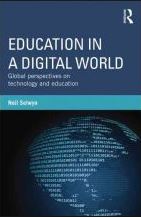Education in a Digital World |

|
 Diese Seite wurde seit 1 Jahr inhaltlich nicht mehr aktualisiert.
Unter Umständen ist sie nicht mehr aktuell.
Diese Seite wurde seit 1 Jahr inhaltlich nicht mehr aktualisiert.
Unter Umständen ist sie nicht mehr aktuell.
 Zusammenfassungen
Zusammenfassungen
 Drawing on a wealth of theoretical and empirical work, Education in a Digital World tackles a number of pressing questions, such as, how are ‘global’ trends in educational technology refracted through national policies and processes? How exactly are educational technologies linked to issues of global economics and the fortunes of national and international economies? To what extent are digital technologies implicated in the commercialisation, marketization and commodification of education?
Drawing on a wealth of theoretical and empirical work, Education in a Digital World tackles a number of pressing questions, such as, how are ‘global’ trends in educational technology refracted through national policies and processes? How exactly are educational technologies linked to issues of global economics and the fortunes of national and international economies? To what extent are digital technologies implicated in the commercialisation, marketization and commodification of education?
These questions, and others, are addressed throughout eight wide-ranging chapters, which consider topics such as the national policy strategies of countries across North and South America, Europe and East Asia, the educational technology portfolios of international organizations such as the United Nations and Microsoft, as well as the role of education and technology in international development and the on-going efforts to provide ‘one laptop per child’ across low-income regions and countries. Through these examples Selwyn develops a detailed analysis of education, technology and globalisation, drawing together arguments and debates from various academic perspectives. Written in a detailed but accessible manner, this is an essential book for anyone wishing to gain a better understanding of the role of education and technology in contemporary globalised society.
 Dieses Buch erwähnt ...
Dieses Buch erwähnt ...
 Personen KB IB clear | W. J. Pelgrum , Tjeerd Plomp , I.A.M. Janssen Reinen | ||||||||||||||||||
 Begriffe KB IB clear |  Digitalisierung
, Digitalisierung
,  Gesellschaft Gesellschaft society
, society
,  Globalisierung Globalisierung globalization
, globalization
,  Notebook Notebook laptop
, laptop
,  Technologie Technologie technology technology
| ||||||||||||||||||
 Bücher |
|
 Dieses Buch erwähnt vermutlich nicht ...
Dieses Buch erwähnt vermutlich nicht ... 
 Nicht erwähnte Begriffe | Bildung, Ein Notebook pro StudentIn (ENpS), Notebooks an Schulen |
 Tagcloud
Tagcloud
 Zitationsgraph
Zitationsgraph
 Zitationsgraph (Beta-Test mit vis.js)
Zitationsgraph (Beta-Test mit vis.js)
 5 Erwähnungen
5 Erwähnungen 
- Digital Skills - Unlocking the Information Society (Alexander J. A. M. van Deursen, Jan A. G. M. van Dijk) (2014)

- Second Handbook of Information Technology in Primary and Secondary Education (Joke Voogt, Gerald Knezek, Rhonda Christensen, Kwok-Wing Lai) (2018)


- 67. Issues and Challenges Related to Digital Equity: An Overview (Paul Resta, Robert T. McLaughlin, Assetou Kouraogo)


- 67. Issues and Challenges Related to Digital Equity: An Overview (Paul Resta, Robert T. McLaughlin, Assetou Kouraogo)
- Education Policy, Digital Disruption And The Future Of Work - Framing Young People’s Futures In The Present (Shane B. Duggan) (2019)

- Evidence of a potential - The political arguments for digitizing education 1983-‐2015 (Jesper Balslev) (2020)


- Die datafizierte Schule (Annekatrin Bock, Andreas Breiter, Felicitas Macgilchrist, Sigrid Hartong, Juliane Jarke, Sieglinde Jornitz) (2023)


- Adaptive Lernsoftware oder adaptierende Lehrkräfte? - Das Ringen um Handlungsspielräume (Felicitas Macgilchrist, Sieglinde Jornitz, Ben Mayer, Jasmin Troeger)


- Adaptive Lernsoftware oder adaptierende Lehrkräfte? - Das Ringen um Handlungsspielräume (Felicitas Macgilchrist, Sieglinde Jornitz, Ben Mayer, Jasmin Troeger)
 Co-zitierte Bücher
Co-zitierte Bücher
 Volltext dieses Dokuments
Volltext dieses Dokuments
 Bibliographisches
Bibliographisches 
 Beat und dieses Buch
Beat und dieses Buch
Beat hat dieses Buch während seiner Zeit am Institut für Medien und Schule (IMS) ins Biblionetz aufgenommen. Beat besitzt kein physisches, aber ein digitales Exemplar. (das er aber aus Urheberrechtsgründen nicht einfach weitergeben darf). Aufgrund der wenigen Einträge im Biblionetz scheint er es nicht wirklich gelesen zu haben. Es gibt bisher auch nur wenige Objekte im Biblionetz, die dieses Werk zitieren.












 , 801 kByte)
, 801 kByte) 



 Biblionetz-History
Biblionetz-History